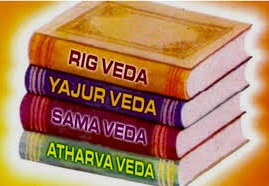
Veda & It's types
Published Date: 6/17/2023 6:07:49 AM
The Vedas are considered the earliest literary record of Indo-Aryan civilization. It is the most sacred scriptures of India. They were meant to be mantras (incantations) in praise of various Aryan gods, it is the age when the Aryans were finding their feet in India. What they also reflect is a startlingly vivid picture of life. Vedas are the treasure troves containing spiritual knowledge encompassing all aspects of our life. Vedic literature with its philosophical maxims has stood the test of time and is the highest religious authority for all sections of Hindus in particular and for mankind in general
The word Veda means wisdom, knowledge, or vision, and it is revered as the language of the gods in human speech. The essence of the Vedas is to regulate the social, legal, domestic, and religious customs of the Hindus which is meticulously pursued to the present day. All the rituals of Hindus conducted upon birth, marriage, death, etc. are based upon Vedic doctrines and they are being followed from time immemorial.
The Vedas are the religious texts which inform the religion of Hinduism (also known as Sanatan Dharma meaning “Eternal Order” or “Eternal Path”). The term Veda means “knowledge” in that it is thought to contain the fundamental knowledge relating to the underlying cause of, the function of, and personal response to existence. They are considered among the oldest, if not the oldest, religious works in the world. They are commonly referred to as “scripture”, which is accurate in that they can be defined as holy writ concerning the nature of the Divine. Unlike the scriptures of other religions, however, the Vedas are not thought to have been revealed to a certain person or persons at a specific historical moment; they are believed to have always existed and were apprehended by sages in deep meditative states at some point prior to c. 1500 BCE but precisely when is unknown.
The Vedas are therefore regarded as Shruti in Hinduism meaning “what is heard” as contrasted with other texts designated Smritis (“what is remembered”), accounts of great heroes and their struggles in works such as the Mahabharata, Ramayana, and Bhagavad Gita (although some sects of Hinduism regard the Bhagavad Gita as Shruti). The texts which make up the Four Vedas are:
- Rig Veda
- Sama Veda
- Yajur Veda
- Atharva Veda